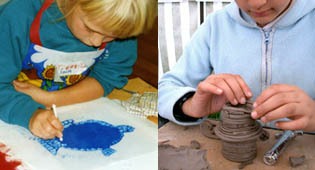











growing concerns
A culture of testing
The combined effects, in the UK, of the current National Curriculum, Standard Attainment Tests (SAT’s), the explicit nature of government inspections of teachers and schools, and the publishing of these results in school league tables has changed the nature of children’s education over the last twenty years.
These pressures on schools and teachers have resulted in a tendency for prioritising areas which are assessed and tested, developing an educational culture of ‘teaching to the test’. Effectively this narrows the range of activities and learning by allowing less time for parts of the national curriculum which are not tested, (particularly all the creative stuff).
The pressure of tests, and revising for the tests, causes stress to children, parents and teachers. The number of times a child is tested throughout their school life is of particular concern. It is a method based on teaching factual information with defined outcomes which can be easily and cheaply tested. It is much more difficult and costly to carry out assessments where there are no clear-
The poet laureate Michael Rosen has written regularly to criticise many government policies on education. He always manages to illustrate his points with great verve in his published letters to the Education Minister:
"Dear Mrs Morgan: Your guidance is a mini syllabus on how to wreck poetry -
resource link > Michael Rosen: Letter From a Curious Parent
The current testing methods, by their very nature, do not allow sufficient time for the idea that children should be encouraged to experiment, taking risks that an idea might not work, to question prevailing opinion, or attempt things which might not be completed -
Narrow targets for testing are attempts to 'reduce the administrative burden' of the regime, but the unintended consequence is to devalue aspects of learning which are not formally assessed -
Outside school, access to activities and facilities such as these can be costly. Disadvantaged children lose out the most when cultural activities are not included within schools. Unfamiliar culture can easily be dismissed as not relevant and not worthwhile -
The idea that this kind of 'non academic' type of activity might possibly open up into interesting and varied job opportunities is not envisaged, and so narrows the future opportunities for many children.
what do we mean -
• there is special knowledge and understanding to be gained by making things
• childhood plays a vital part in this innovative process
a historical perspective
• observation, trial and error
• origins of maths
• patterns and geometry
facing the future
growing concerns
• Neil MacGregor
• Sherry Turkle
• Seymour Papert